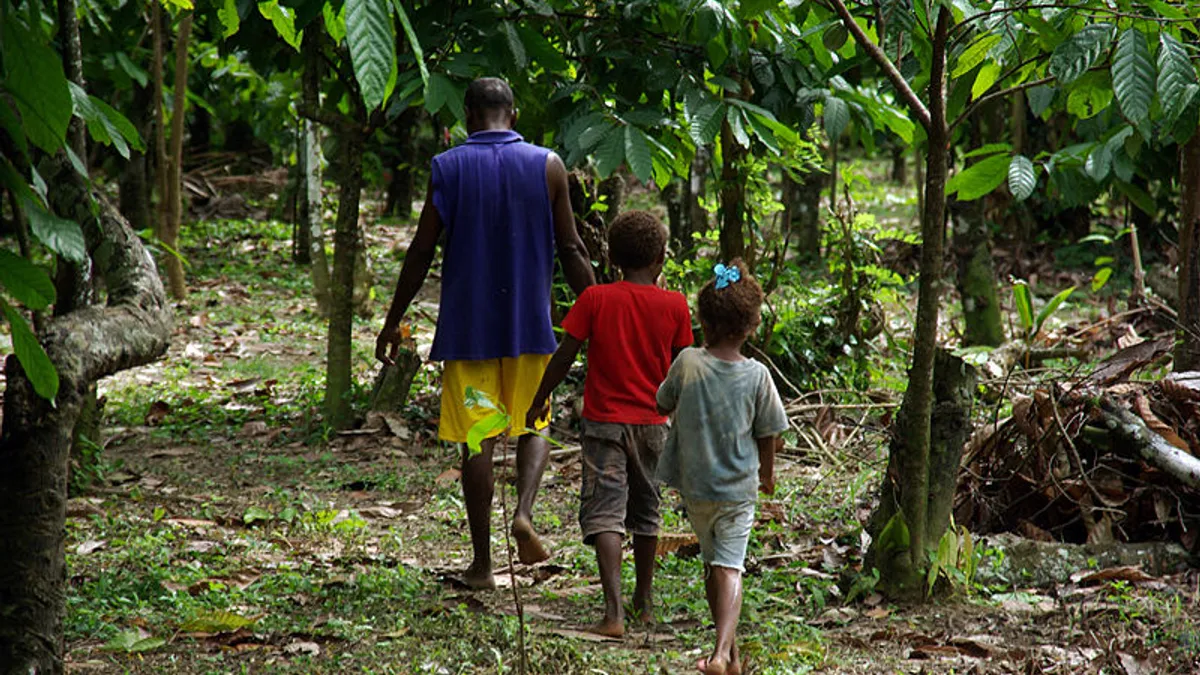UPDATE: June 17, 2021: The U.S. Supreme Court threw out a lawsuit against Nestlé and Cargill that claimed the companies were complicit in contributing to slavery at cocoa farms in Ivory Coast. The 8-1 ruling overturned a lower court decision that allowed the lawsuit, filed in 2005, to move forward. Reuters said the court, however, sidestepped a broader ruling on the permissibility of suits accusing American companies of human rights violations abroad.
Dive Brief:
- The U.S. Supreme Court heard oral arguments Tuesday on whether Nestlé USA and Cargill can be held accountable for child slavery on farms in Africa where they source cocoa. The justices seemed unlikely to stop lawsuits against American companies over these allegations, but they could throw out the case against Nestlé USA and Cargill, Reuters reported.
- Six former child slaves are asking for damages from Nestlé USA and Cargill, alleging they were trafficked and forced to work on Ivory Coast cocoa farms. Their attorneys argue the companies knew their suppliers in Africa were using child labor.
- Lawyers for Nestlé USA and Cargill argued what the plaintiffs allege is "horrific" but that the defendants are "not the locators, not the overseers, and not the farm." A final ruling is expected by the end of June and could further shake up how American food companies monitor their international suppliers.
Dive Insight:
The original lawsuit accuses Nestlé USA and Cargill of aiding and abetting human rights violations because of their role in buying Ivory Coast cocoa. Now, the Supreme Court is weighing in on whether that lawsuit can stand. During the arguments Tuesday, the justices proposed concerns about the impact of both ruling with the food companies in this case and ending the lawsuit against them.
For years now, reports have revealed that companies, particularly in the cocoa industry, aren't doing enough to eliminate child labor from their supply chains. Despite pledges to do so, The Washington Post reported last year the world's largest chocolate companies missed deadlines in 2005, 2008 and 2010 to eradicate child labor among their suppliers.
The global chocolate supply depends on more than 1 million child workers, and, despite efforts, child labor continues to occur. A recent report from the U.S. Department of Labor and the National Opinion Research Center found child labor in cocoa production areas of Côte d’Ivoire and Ghana jumped 14% between 2009 and 2019. That increase in child labor corresponded with a 62% rise in cocoa production during the same period, the report found.
"These corporations set up a supply chain where they know that cocoa beans are being made by means of child-slave labor," attorney Paul Hoffman said during the arguments Tuesday. "They know that's where the cheap beans come from."
In the case before the Supreme Court, the companies are pushing for the justices to reverse a lower court ruling that allowed the lawsuit, which was originally filed in 2005, to go forward. The case is associated with the 1789 Alien Tort Statute, which allows non-U.S. citizens to seek damages in U.S. courts.
The corporations claim U.S. courts are the wrong place for the complaint and that the law allows these cases against individuals, like the traffickers and farmers, but not the companies. Nestlé USA and Cargill also have said they have taken steps to eliminate these issues in their supply chains.
Companies and business groups have challenged these kinds of lawsuits. In an amici curiae brief, filed by groups such as the U.S. Chamber of Commerce and the National Association of Manufacturers, the groups argued the cases are "heavy legal and reputational burdens on companies that are sued on the basis that they conducted business with foreign actors accused of committing torts abroad." In the last 25 years, foreign nationals have filed more than 150 of these types of lawsuits against U.S. and foreign companies for international violations, the groups said.
Both sides faced questions and skepticism from the justices during the oral arguments, and a lot is riding on the ruling next year. If the justices were to rule in favor of Nestlé USA and Cargill, it could curtail how international victims of human rights violations are able to use U.S. courts to sue. But if the court rule against the food giants, more companies could face lawsuits for crimes their suppliers commit internationally.
















